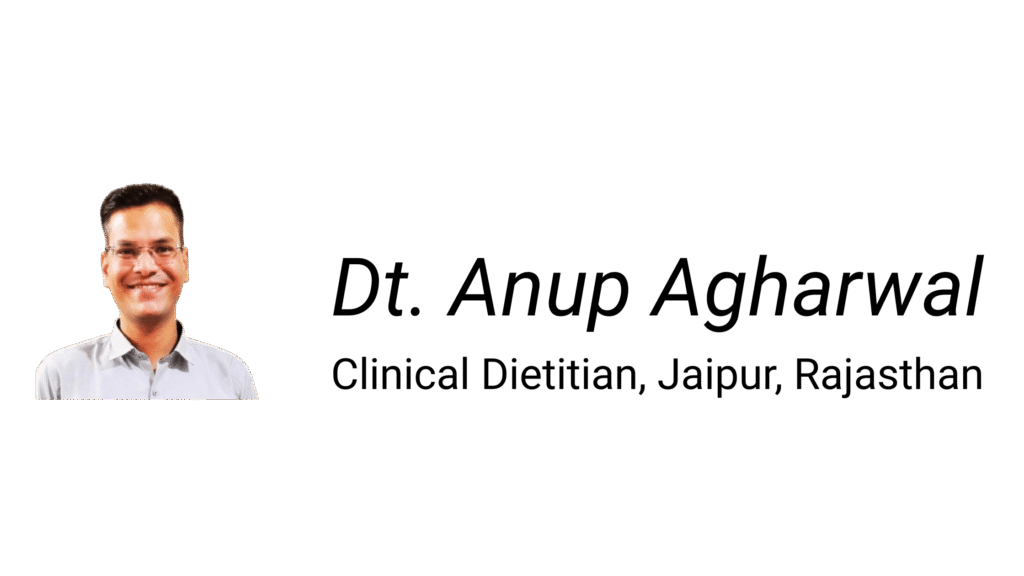

Table of Contents
This blog covers food myths busted by science — especially the ones Indians still believe without proof. In India, food is more than just fuel — it’s deeply tied to culture, tradition, and family beliefs. Over generations, many food myths have become part of our daily lives. From being told not to eat mango and milk together, to avoiding curd at night, we’ve all grown up hearing these so-called “rules.”
But what if many of these beliefs are not backed by science?
In today’s world, where accurate nutrition knowledge is just a click away, blindly following outdated ideas can sometimes do more harm than good. That’s why it’s time to pause and ask: Are these food myths actually true, or have we just believed them for too long?
In this blog, we uncover the truth behind 10 powerful food myths that many Indians still believe. Backed by evidence-based research, we break down what’s real and what’s just a myth — so you can make smarter choices for your health.
It’s time to let go of misinformation and embrace scientific nutrition. Let’s separate food facts from food fiction, and nourish our bodies the right way.
1. Myth: Mango and Milk Are a Dangerous Combination
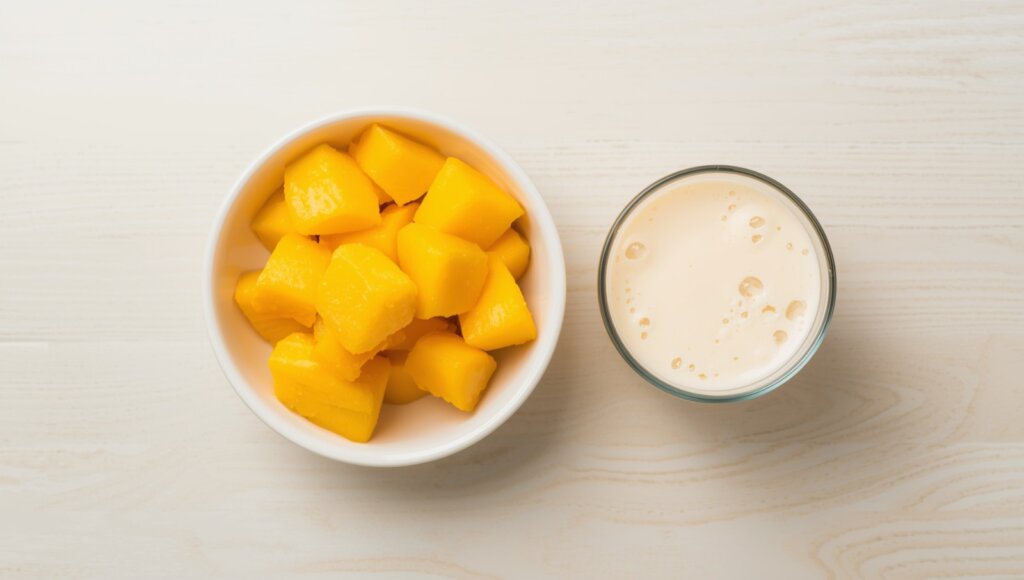
Truth: It’s completely safe (and even healthy) to have them together.
This is one of the most commonly believed food myths in Indian households — the idea that mixing mango (a fruit considered “hot”) with milk (considered “cooling”) can cause digestive problems, skin issues, or even toxicity. But this is nothing more than an old wives’ tale.
In reality, there is no scientific evidence to support the claim that combining mango and milk is dangerous. In fact, this combination is used in Ayurveda for nourishing recipes, and is a staple in modern beverages like mango milkshake and mango lassi — both consumed widely in India and abroad without any adverse effects.
According to modern nutrition science:
- Both mango and milk are rich in essential nutrients.
- Mango is high in vitamin C, fiber, and antioxidants.
- Milk is packed with calcium, protein, and B vitamins.
When combined, they make a balanced, energy-boosting drink, especially for kids, athletes, and underweight individuals. Just ensure that:
- Both the mango and milk are fresh.
- You avoid this combo if you’re lactose intolerant.
In fact, mango-based smoothies with almond milk or dairy milk are promoted globally in diet plans, including weight gain shakes and post-workout meals.
So next time someone tells you that mango and milk are a bad combo — hand them a glass of mango milkshake and share the science behind it!
2. Myth: Bananas Cause Cold and Should Be Avoided in Winter
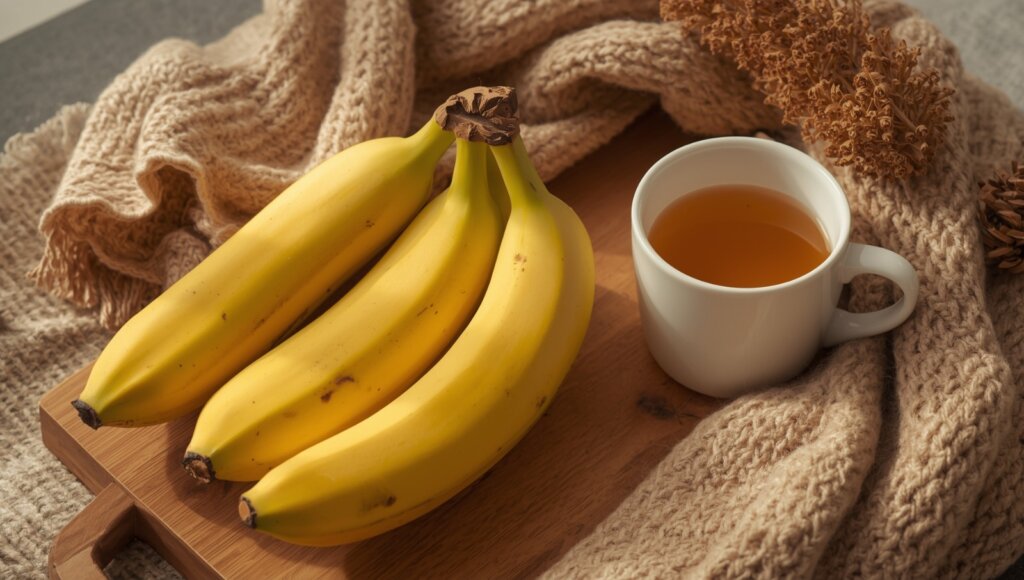
Truth: Bananas do not cause cold or increase mucus.
This popular food myth is especially common in Indian households, where elders often warn against eating bananas during winter, at night, or when someone has a cold. The belief stems from Ayurveda’s classification of bananas as having a “cooling” effect on the body. But let’s set the record straight — science says otherwise.
There is no scientific evidence proving that bananas cause cold, cough, or increase mucus production. In fact, bananas are one of the most digestible and nutrient-rich fruits you can eat — in any season. According to WebMD, bananas support cardiovascular and digestive health with their abundant potassium and fiber
Here’s what modern nutrition says about bananas:
- Rich in Potassium: Helps in maintaining electrolyte balance and healthy blood pressure.
- High in Fiber: Supports smooth digestion and gut health.
- Natural Sugars (Fructose & Glucose): Provide a quick source of energy — especially great for kids, athletes, and during recovery.
- Vitamin B6 & C: Support brain function and immunity.
Even pediatricians recommend mashed banana as one of the first solid foods for babies — clearly indicating it’s safe and beneficial, regardless of weather.
You can enjoy bananas in smoothies, breakfast bowls, oatmeals, or simply on their own — even in winter. Just avoid them if you have a specific banana allergy or if advised against by your doctor due to a particular health condition.
3. Myth: Ghee Makes You Fat
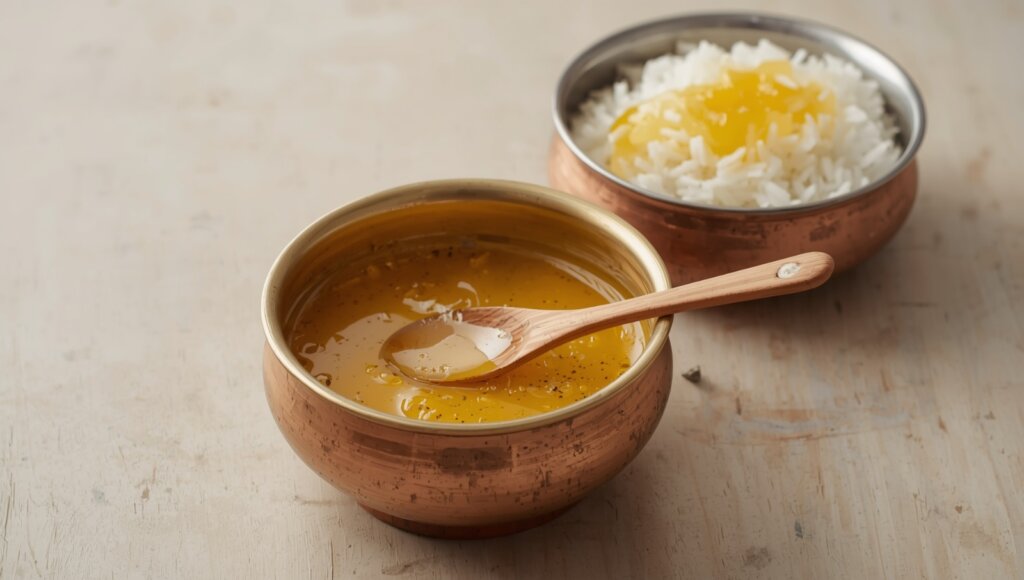
Truth: Ghee is a healthy fat when used in moderation.
This is one of the most misunderstood food myths — especially among people trying to lose weight. Ghee, also known as clarified butter, is often blamed for causing weight gain, increasing cholesterol, and clogging arteries. As a result, many health-conscious individuals avoid it entirely, replacing it with refined oils or “low-fat” alternatives.
But modern science — and even ancient Ayurveda — agree: ghee is not the enemy.
Ghee is a natural source of healthy fats, and when consumed in the right quantity, it offers multiple health benefits.
A Healthline article on ghee clarifies that when compared to butter, ghee offers a higher smoke point and may have potential heart-health benefits
Here’s what science says about ghee:
- Contains Butyric Acid: A short-chain fatty acid that supports gut health, reduces inflammation, and improves digestion.
- Rich in Healthy Saturated Fats: Essential for hormone production, brain function, and cell repair.
- High Smoke Point: Ideal for cooking at high temperatures, unlike many refined oils that break down and release toxins.
- Lactose & Casein-Free: Suitable for most people who are lactose intolerant.
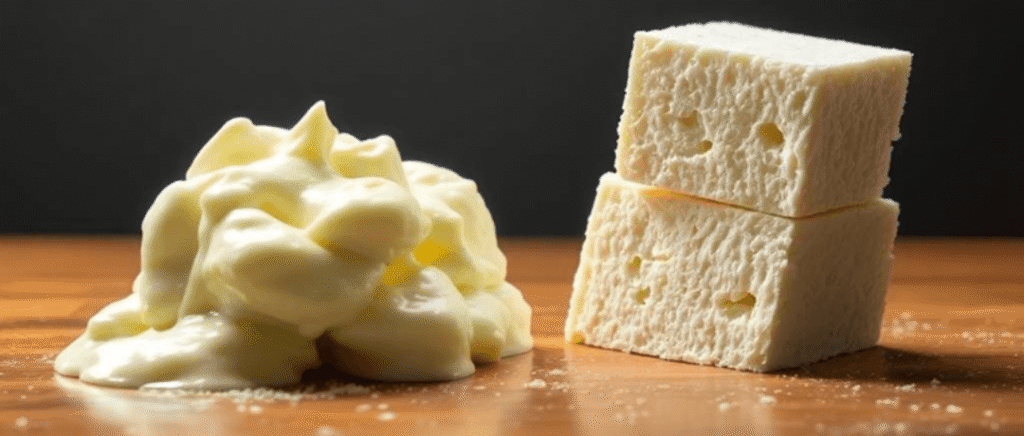
Contrary to the myth, ghee can actually support weight loss by improving metabolism and promoting satiety (feeling of fullness). Several studies have shown that moderate consumption of healthy fats, including ghee, helps maintain balanced cholesterol levels and supports heart health.
Important Note: The key is moderation. A teaspoon of ghee in your dal, roti, or rice is perfectly healthy — but drowning your paratha in it is not.
4. Myth: Avoid Curd at Night
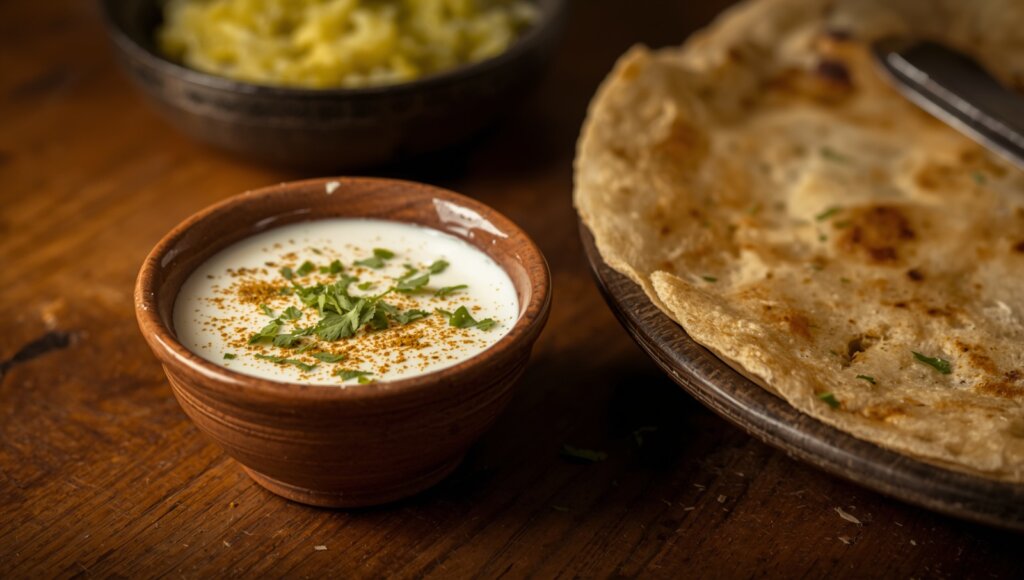
Truth: Curd can be eaten at night — just don’t overdo it.
This food myth is a favorite among elders in many Indian households: “Don’t eat curd at night, it causes cold and cough.” While it may have roots in traditional Ayurveda, modern science gives us a more balanced perspective.
According to Ayurveda, curd is considered “Kapha increasing”, which may cause excess mucus in people who already have respiratory issues or sinus problems. However, this does not mean curd is harmful for everyone — especially not when consumed in moderation.
What modern nutrition says:
- Curd is a probiotic — meaning it contains healthy bacteria that improve gut health and digestion.
- It’s a great source of calcium, protein, and vitamin B12.
- It can help improve immunity, reduce acidity, and even support weight management.
Several studies confirm that curd or yogurt can be safely consumed at night unless you have a cold, asthma, or sinus congestion. Even then, it depends on individual tolerance. Many people regularly consume curd at dinner — in the form of raita, buttermilk, or plain dahi — and experience no issues at all.
Pro Tip: If you prefer having curd at night, make sure it’s:
- Fresh (not sour or stale)
- Plain (not flavored or sugary)
- Eaten in moderation
5. Myth: Rice at Night Causes Weight Gain
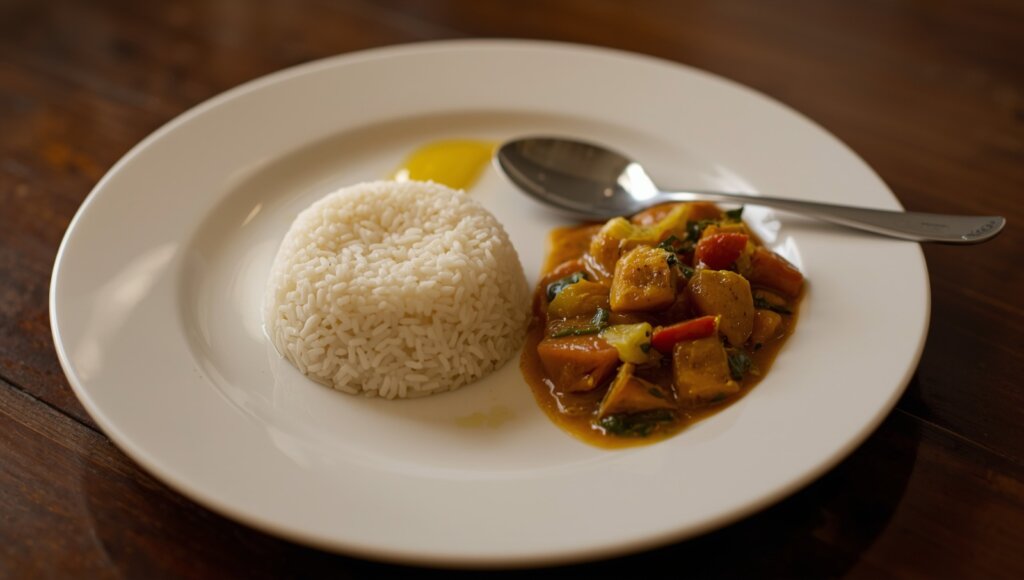
Truth: Rice does not cause fat gain if eaten in controlled portions.
One of the most persistent food myths in India is that eating rice at night will automatically lead to weight gain or make you fat. As a result, many people completely cut out rice from their dinner or daily diet, especially when trying to lose weight.
However, this belief is not supported by science.
Rice is a staple in many cultures across the world — including Japan, where people consume rice regularly and still maintain low obesity rates. The truth is, weight gain doesn’t come from rice, but from eating more calories than your body burns — regardless of the source.
Here’s what science says about rice and weight:
- White rice is easy to digest and contains minimal fat.
- It is low in sodium and cholesterol-free.
- When eaten with a source of protein and fiber (like dal, vegetables, or curd), it makes for a balanced meal that supports satiety and digestion.
- Rice contains resistant starch, which may help improve metabolism and gut health when cooled and reheated.
The real issue is overeating, eating rice along with heavy fried food, or leading a sedentary lifestyle. If you’re eating dinner late at night and then going to bed immediately, that habit — not rice — may be the problem.
Healthy ways to include rice at night:
- Choose steamed rice over fried.
- Control portion size — about 1 small katori (cup) is enough.
- Pair with dal, sabzi, or curd to make it a complete, protein-rich meal.
- Avoid pairing with high-fat curries or overeating carbs without balance.
You do not need to fear rice if you’re eating mindfully. In fact, for some people, a light rice-based dinner is easier to digest and can even promote better sleep.
6. Myth: Drinking Water Immediately After Eating Fruits Is Harmful
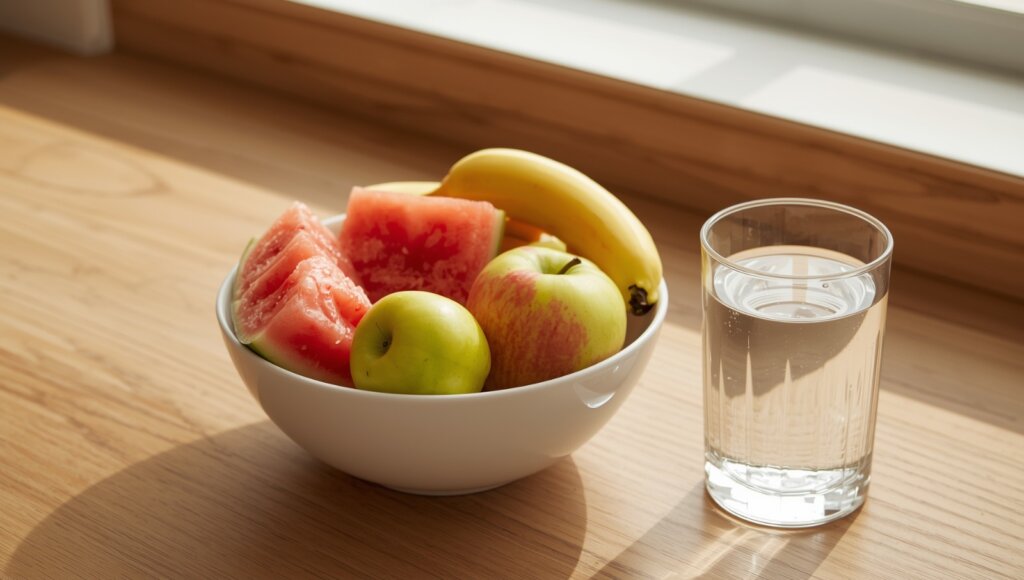
Truth: Drinking water after fruits does not harm digestion or cause illness.
This food myth is often passed down with warnings like: “Don’t drink water after eating watermelon or banana — it will cause gas or indigestion!” Some even believe it leads to skin diseases, cough, or slows down digestion. But none of these claims hold up under scientific review.
In fact, there is no medical or scientific evidence showing that drinking water after eating fruits causes any harm to your health.
What actually happens when you eat fruit:
- Fruits like watermelon, oranges, and grapes already contain over 80–90% water.
- Your body digests fruits in the small intestine, and water simply aids in moving food through the digestive system.
- Water does not dilute stomach acid in a harmful way — the body adjusts acid levels as needed.
In some cases, drinking ice-cold water right after certain fruits might make sensitive people feel bloated temporarily — but that’s not dangerous. It’s a matter of individual comfort, not a health risk.
Why this myth became popular:
This belief may have roots in traditional Ayurvedic ideas or isolated personal experiences. However, modern nutrition does not support this idea as a general rule.
What science recommends:
- You can drink water before, during, or after eating fruits.
- If you experience bloating, simply space water 10–15 minutes apart from fruits — not because it’s harmful, but to improve comfort.
- Always drink clean, room temperature or lukewarm water, especially with high-water-content fruits like melons and cucumber.
So go ahead — have that glass of water after your apple or banana. Just focus on hydration, portion control, and freshness.
7. Myth: Eggs and Milk Should Never Be Eaten Together
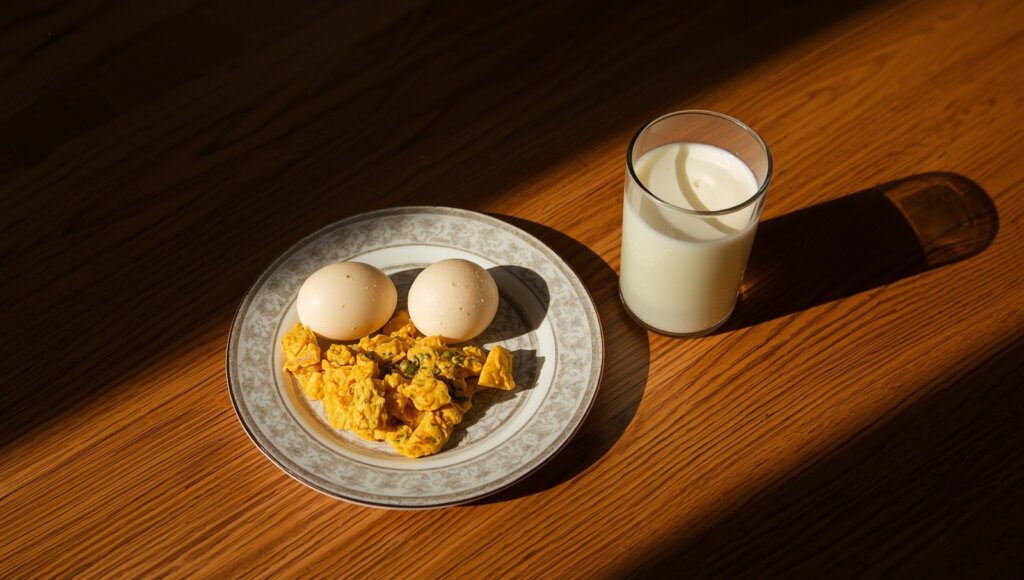
Truth: Eggs and milk can be safely consumed together — and are often recommended for better nutrition.
Among the many food myths busted by science, this one—combining eggs and milk—surprises most people.. This myth likely originates from cultural taboos and outdated beliefs that mixing two animal-based proteins (like egg and milk) can “clash” in the stomach and cause digestive problems, skin issues like vitiligo, or toxicity. However, modern science and clinical nutrition strongly disagree with these claims.
There is no evidence that consuming eggs and milk together is harmful for healthy individuals. In fact, they are a nutritionally powerful combination, especially for growing children, athletes, and those looking to build muscle.
Here’s what science says:
- Eggs are a complete protein source with all essential amino acids, vitamin D, choline, and healthy fats.
- Milk is rich in calcium, vitamin B12, protein, and supports bone health.
- When consumed together — like in scrambled eggs with a glass of milk or milk-based egg curry — they offer a complete protein-rich meal.
In fact, many fitness professionals recommend this combination for post-workout recovery, as it helps in muscle repair and provides sustained energy.
When you should be cautious:
- If you have a known egg or milk allergy, you should avoid either or both.
- Make sure both egg and milk are fresh and cooked/stored properly.
- If you’re following a specific Ayurvedic or therapeutic diet, consult your practitioner.
Otherwise, there’s no reason to fear this food pairing. Many people around the world consume eggs and milk in the same meal daily — without any negative effects.
8. Myth: Microwaving Food Destroys Its Nutrients
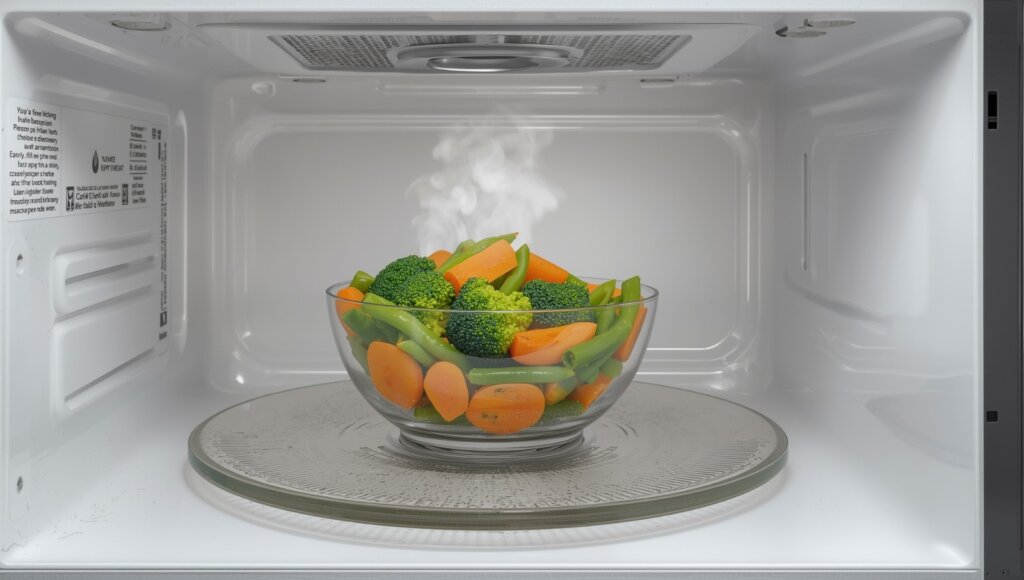
Truth: Microwaving is one of the safest and most nutrient-friendly cooking methods — when used correctly.
This myth is widespread and often causes unnecessary fear. Many believe that using a microwave “kills” the nutrients in food, makes it radioactive, or changes the food’s chemistry in harmful ways. But these are misconceptions, not facts.
The truth is that microwaving does not destroy nutrients any more than other cooking methods like boiling or frying. In fact, it can actually preserve nutrients better, especially water-soluble vitamins like vitamin C and B-complex.
What science says:
- Microwaves cook food by using non-ionizing radiation that causes water molecules in the food to vibrate and generate heat.
- This process does not make food radioactive or unsafe.
- Since microwave cooking is fast and uses little or no water, it minimizes nutrient loss — especially compared to boiling or overcooking.
- Several peer-reviewed studies have confirmed that microwaving vegetables can preserve their antioxidant levels better than other methods.
Important safety tips:
- Use microwave-safe glass or ceramic containers. Avoid plastic containers unless they are clearly labeled “microwave safe.”
- Do not overheat or reheat food multiple times.
- Stir food while reheating to ensure even heating and avoid hot spots.
So, instead of avoiding the microwave, learn how to use it smartly. It’s a time-saving and efficient way to cook or reheat your meals without compromising nutrition.
9. Myth: Eating Carbs at Night Leads to Weight Gain
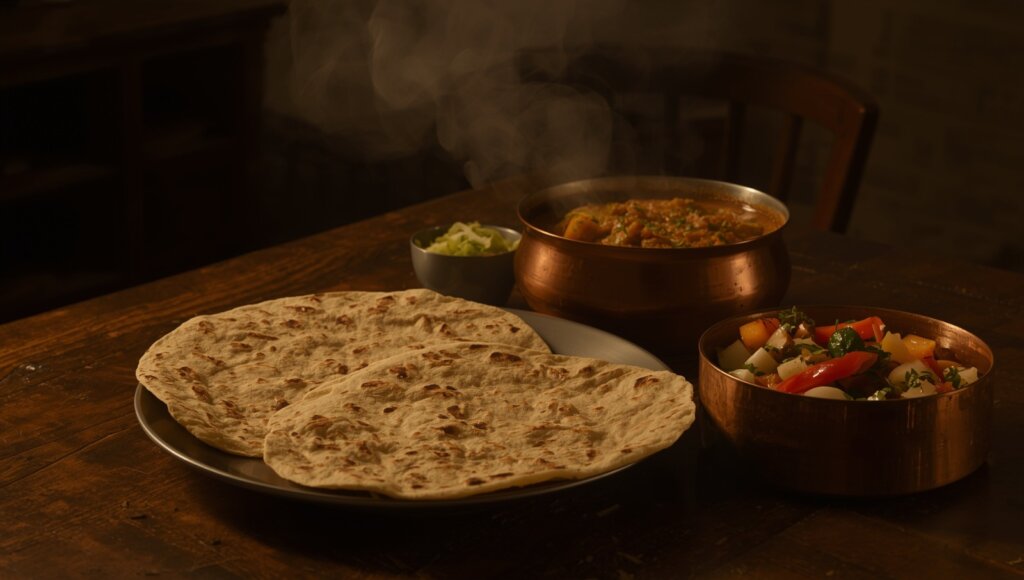
Truth: Carbs at night don’t cause fat gain — excess calories do.
One of the most common dietary fears, especially among those trying to lose weight, is that eating carbohydrates at night turns directly into fat. People often avoid roti, rice, or fruit at dinner, thinking that carbs eaten late in the day won’t be “burned off” and will automatically lead to weight gain.
But this belief is not supported by evidence.
The truth is that weight gain occurs when you consume more calories than your body uses, regardless of the time of day those calories are consumed.
What science says:
- Carbohydrates are your body’s primary energy source, and they also play a role in promoting serotonin production, which helps you sleep better.
- Several studies have shown that eating carbs at night may actually support better satiety, sleep, and even fat loss, especially when paired with a balanced diet and exercise routine.
- It’s not when you eat carbs that matters — it’s how much and what type you eat.
For example, having a whole wheat roti with dal or a small portion of brown rice with vegetables is perfectly healthy at dinner. It gives your body fuel, fiber, and essential nutrients.
Tips for eating carbs smartly at night:
- Choose complex carbs like brown rice, oats, quinoa, or whole wheat roti.
- Pair them with protein (dal, paneer, eggs) and fiber (vegetables or salad).
- Watch portion sizes — don’t overeat, especially right before bed.
- Avoid refined carbs like white bread, sugary cereals, or desserts.
So, instead of fearing carbs at night, focus on balance and portion control. When consumed wisely, carbs can actually support your metabolism and help you sleep better.
10. Myth: Coconut Oil Is Bad for Heart Health
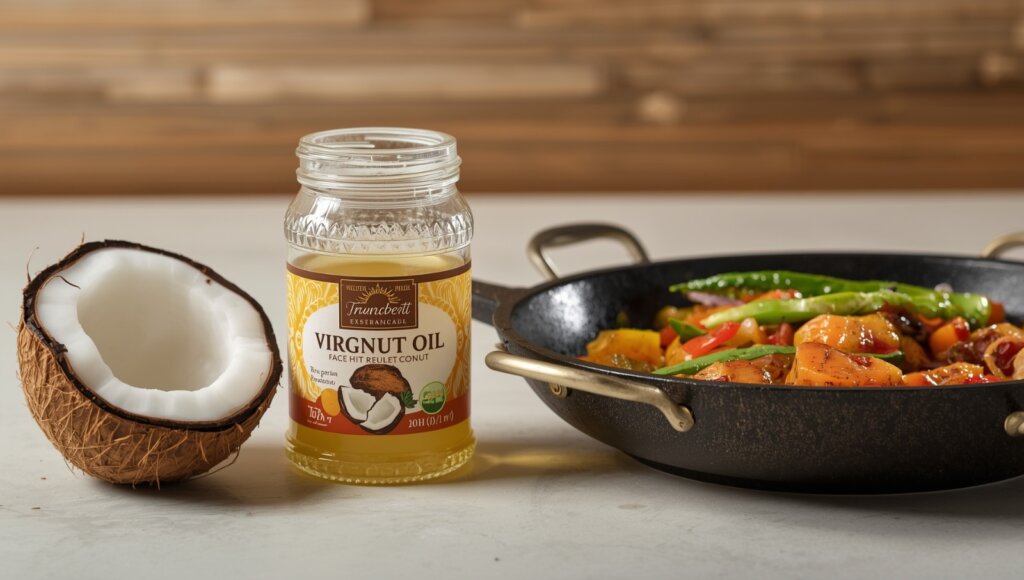
Truth: Coconut oil can be part of a healthy diet when used in moderation — it’s not the enemy.
For years, coconut oil was labeled as “unhealthy” due to its high saturated fat content. Many health professionals and diet trends advised people to replace it with vegetable oils, fearing it would raise cholesterol and increase heart disease risk. This belief caused widespread confusion — especially in tropical countries like India, where coconut oil has been used traditionally for generations.
But recent studies show that this fear is oversimplified and outdated.
What science really says:
- Coconut oil is rich in medium-chain triglycerides (MCTs) — a type of fat that may be more easily digested and used for energy rather than stored as fat.
- It contains lauric acid, which has antimicrobial properties and may support immunity.
- Some studies have found that moderate coconut oil intake can increase HDL (“good”) cholesterol — and not necessarily lead to harmful levels of LDL (“bad”) cholesterol.
- Populations that use coconut oil traditionally (like in Kerala and parts of Southeast Asia) don’t show higher heart disease rates when their overall diet is unprocessed and active.
The key: moderation and balance.
- Coconut oil should not be your only cooking oil. Rotate with heart-healthy oils like mustard oil, olive oil, or groundnut oil.
- Avoid hydrogenated or refined coconut oil — always go for cold-pressed, virgin coconut oil.
- Use coconut oil in cooking that suits it — such as stir-frying, sautéing, or traditional South Indian recipes.
So, no — coconut oil isn’t a “heart attack in a jar.” Like any fat, it’s healthy when used in moderation and as part of a balanced, active lifestyle.
Choose Facts Over Fear
By recognizing these food myths busted by science, we empower ourselves to eat smarter, not just traditionally. In a country as rich in tradition as India, it’s natural that food beliefs are passed down through generations. But not all of them are rooted in science — and blindly following these myths can sometimes hold us back from making healthier, more informed choices.
This blog aimed to challenge 10 popular food myths using evidence-based science. From the truth about ghee and curd, to rice and coconut oil — we’ve seen that the real key to health isn’t fear, but balance, awareness, and mindful eating.
Remember:
Your body deserves facts, not fear.
Before eliminating foods or falling for viral health claims, ask yourself — What does science actually say?

🎯 10+ years of Experience
🎓 10k+ Trained ( 📍 Jaipur )
💪 Helping change people’s lives
🌿 Most trusted lifestyle counselor
